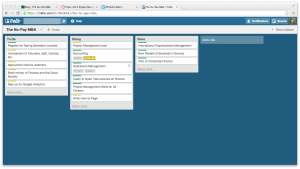A Complete Guide to Getting an MBA-Level Business Education at a Fraction of the Cost
Learn More

Laurie Pickard
Author of Don't Pay For Your MBA
Hi! I’m Laurie. I used massive open online courses (MOOCs) from platforms like Coursera and edX to get a business education equivalent to an MBA - for less than 1/100th the cost of a traditional MBA degree.
My journey with MOOC-based education began when I saw an opportunity to build the business education I had long desired without going into debt. For me, as an international development worker, MOOCs had the added benefit of being accessible from anywhere.
My book and the resources on this site are for anyone seeking a world-class business education using the free and low-cost tools of the internet. I hope you find them useful!
The No-Pay MBA Blog
Maintaining Motivation
By far the biggest challenge when taking an online course is maintaining motivation. With no professor to praise you, no fellow students to foster competition, and – in a MOOC, at least – no credit-granting institution to hold you accountable, you have only your own will power and determination to get you through. Finishing one course – let alone enough courses to add up to a degree - requires a disciplined, intrinsically motivated student.
read moreHow to Make a Good MOOC
I am not overly concerned about whether my coursework falls into the MOOC genre. Rather, what matters to me is that my courses be free or nearly free, that they cover subjects that are MBA-relevant, and that they allow me the opportunity achieve mastery in a subject area.
read moreProject Management: A Love Story
Now, project management is kind of my thing. Even though I haven’t studied it formally until now, project management is the bread and butter of my professional life. I am the type of person who gets truly excited about a well-designed spreadsheet, and creating a color-coded calendar is the type of thing I might do for fun, so I was a bit skeptical that this intro course geared towards accidental project managers would have anything to offer me.
But already in the first two modules we have covered some material that I have found interesting and enlightening.
read moreNPV of the No-Pay MBA
“A dollar today is worth more than a dollar tomorrow.” Most of us have probably heard someone say something to this effect. We understand intuitively that a dollar in hand is preferable to a dollar some future date. But why is this true?
Turns out it is possible to calculate exactly how much more a dollar today is worth than a dollar tomorrow, five years from now, or twenty years from now. The discount rate, otherwise known as the rate of inflation, can be used to take today’s dollar and translate it into future dollars – or to figure out how much a future amount of cash would be worth today.
read moreWhy I’m Glad I Stuck With My Least Favorite Course
My most disappointing course this semester was International Organizations Management. I chose the course because I work in this field and was curious what the instructors would present. The course was taught by a group of professors from the University of Geneva, all of whom are on the faculty of that university’s international MBA program. As I’ve mentioned previously, most of the jobs in international development, and I would imagine in international organizations more generally, are management jobs. However, our training is mostly theoretical, so one must learn the practical skills of management while on the job. I was hoping that this class would cover some of these skills, especially since the recommended background for the course was “Graduate students of international relations/business management/international law and/or professionals with a few years of relevant work experience.”
read more7 Sources of Waste – In Last Night’s Dinner
Operations Management is one of those classes that causes you to see your whole world differently. The class is more conceptual than mathematical – though there is some math involved – and we’ve covered such concepts as The 4 Dimensions of Performance, The Bottleneck in a Production Line, Inventory Turns, Throughput, and Capacity. Now I’m looking at every multi-step process in my life with new eyes. I even found The Seven Sources of Waste – and hence the opportunities for improved efficiency – in the Indian vegetable curry and garlic naan I made for dinner yesterday evening.
read moreHow Do We Learn?
Of course education is more than just transmitting facts, but learning how to use information must be an active process, one in which the teacher can guide the students, but for which students must ultimately be responsible. It doesn't matter how many people you're trying to teach - you're never teaching everyone at once because everyone ultimately has to teach themselves.
read moreStatement of Accomplishment
I respect Coursera's efforts at bringing legitimacy to free coursework, but I don't place a lot of value on the SOA, primarily because the level of difficulty is highly variable from course to course. The class for which I received the SOA was interesting, but incredibly easy. I listened to the lectures each week, but I could have answered each week's five-question quiz correctly without having done so. In contrast, last week I spent a couple of hours on the homework for my Intro to Operations Management course and had to re-watch a couple of the video lectures.
read moreWho’s in my MOOC?
My Intro to Accounting professor recently posted some demographic information from the course pre-enrollment survey. I find this data fascinating, so I’m sharing the highlights here.
read moreA Practical Education
Accounting - and accountants - have a reputation for being terribly dull, and even the professor apologizes frequently for the dryness of the material. But I am positively loving it. Tracking accounts feels like one long logic puzzle, and I love logic puzzles. I also appreciate that the course gives specifics on how to do a particular job. I am learning how to put together the four financial statements that all accountants are responsible for creating, and how to do so in accordance with the standards of the profession.
read moreAre You Getting Credit for That?
when I tell people I am designing my own MBA program from free online courses, the most common question I get asked is, are you getting credit? No, I'm not. But I believe that the coursework is intrinsically valuable, with or without the piece of paper.
read moreNew Models of Business in Society, Work/Life Balance, and Personal Productivity
First semester is in full swing. I'm taking three courses - Introduction to Corporate Finance, Introduction to Accounting, and a class called New Models of Business in Society. Finance and accounting are "hard skills" classes involving numbers, spreadsheets, and generally accepted rules and principles. New Models in of Business Society is part of a unit on leadership that I am including in my first year curriculum.
read more









